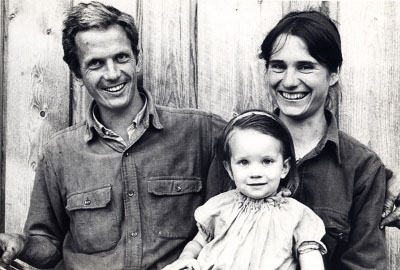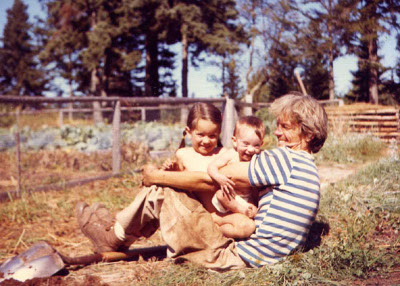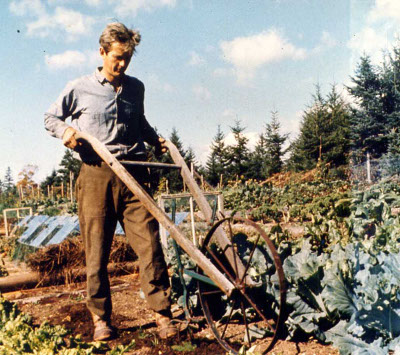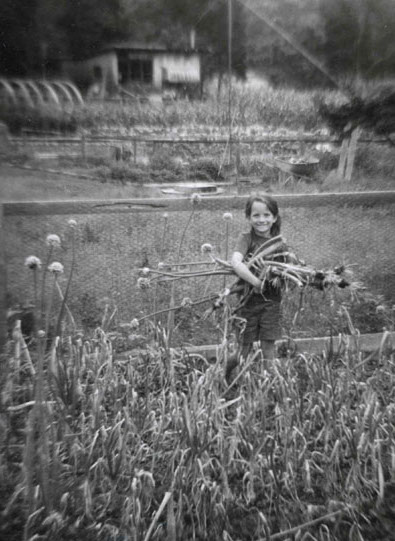
This Life is In Your Hands
 If Possum Living is the fun, beach read, Melissa Coleman's This Life is In Your Hands is a hard-hitting expose and
cautionary tale. The author writes about the joys and woes of
being the child of passionate organic farmers and homesteaders (Eliot
Coleman and his
wife) living next door to the Nearings.
If Possum Living is the fun, beach read, Melissa Coleman's This Life is In Your Hands is a hard-hitting expose and
cautionary tale. The author writes about the joys and woes of
being the child of passionate organic farmers and homesteaders (Eliot
Coleman and his
wife) living next door to the Nearings.
Most people will
probably pick up the book the same way they would slow to gawk at a
wreck along the highway, but the death of Melissa's sister (perhaps
from parental neglect)  was not the only tragedy
found between its pages. Instead, a deeper and more universal
affliction seems to have befallen most of the idealists who went back
to the land in the sixties and seventies, and those of us following in
their footsteps would do well to take heed.
was not the only tragedy
found between its pages. Instead, a deeper and more universal
affliction seems to have befallen most of the idealists who went back
to the land in the sixties and seventies, and those of us following in
their footsteps would do well to take heed.
Eliot Coleman had
hyperthyroidism combined with a passion for uncovering the secrets of
organic gardening --- the first gave him the energy to work long hours
and the second made the farm seem more important  than his family. In
contrast, his wife was prone to depression and would check out of daily
life by fasting or standing on her head --- the only ways she knew to
combat a mental fatigue that her physically present but emotionally
absent husband did nothing to correct. The end result (yes, I'm
going to ruin it for you) was neglected children and, eventually,
divorce.
than his family. In
contrast, his wife was prone to depression and would check out of daily
life by fasting or standing on her head --- the only ways she knew to
combat a mental fatigue that her physically present but emotionally
absent husband did nothing to correct. The end result (yes, I'm
going to ruin it for you) was neglected children and, eventually,
divorce.
As Melissa Coleman wrote
near the end of her book:
 The sad truth is that
homesteads are like a lover or child --- enticing, beguiling, but also
oh so needy of your time and thoughts. If you can't mitigate your
relationship to the land in some way, you're bound to end up breaking
the human ties you also depend on.
The sad truth is that
homesteads are like a lover or child --- enticing, beguiling, but also
oh so needy of your time and thoughts. If you can't mitigate your
relationship to the land in some way, you're bound to end up breaking
the human ties you also depend on.While reading This Life is In Your Hands, I could completely envision what my homesteading journey would have been like without Mark's painstaking efforts to help me mix some realism with my idealism. I would have been hauling five gallon buckets of water from the creek to irrigate the garden by hand like my mother did, eschewing the idea of paying a neighbor for firewood, and generally working my fingers to the bone. In the end, exhaustion resulting from my passion for homesteading and permaculture would probably have driven me off the farm like so many other back-to-the-landers, leading to an overall harsher environmental footprint than the one I currently make when I allow us to drift away from the homesteading ideal from time to time. All I can say is --- I'm eternally grateful that the romantic lottery netted me Mark instead of Eliot Coleman!
Our chicken waterer keeps chicken chores to a
minimum so we have more time to enjoy our flock.
Want more in-depth information? Browse through our books.
Or explore more posts by date or by subject.
About us: Anna Hess and Mark Hamilton spent over a decade living self-sufficiently in the mountains of Virginia before moving north to start over from scratch in the foothills of Ohio. They've experimented with permaculture, no-till gardening, trailersteading, home-based microbusinesses and much more, writing about their adventures in both blogs and books.
Want to be notified when new comments are posted on this page? Click on the RSS button after you add a comment to subscribe to the comment feed, or simply check the box beside "email replies to me" while writing your comment.

It's sad to learn this about the infamous Elliot. Every family has troubles, it's a given. I personally don't understand why someone's dirty laundry has to be aired for all to see (by this book, not by your mentioning it), but I'm not one who would pull over and gawk at an accident either and I've never understood that macabre habit.
The misfortunes of others should be treated with respect. Is this a profitable exercise (I don't mean monetarily either) or just an American trend like those hideous realty shows? I can't see that it would enhance unity in the Coleman family but perhaps it's considered too late for that.
Someone also wrote a book about the Nearings not being what the public thought they were. I read their book and thought it should have been kept as a technical manual because they definitely weren't writers and had some pretty odd ideas. Must have been the lack of B-12.
In most cases I agree with you about knowing the personal lives of public figures. It just doesn't make sense to me that a political figure's extramarital affair affects the way they do their job, and I really don't understand the personality cult that surrounds famous actors and actresses.
That said, this book really goes beyond airing dirty laundry. I think that Melissa Coleman did a really good job of showing the good as well as the bad in her childhood and in her parents, and you feel more sorry for Elliot and his wife than angry at them. This Life is In Your Hands feels like it holds lessons for everyone interested in simple living, and I'm still digesting it. For that reason, I think it was worth writing, although I can see how Eliot Coleman would be very unhappy about it, and if the family wasn't already torn apart, the book might not have been worth publishing.
I also think that the Nearings were more tangled up in all of this than Melissa Coleman let on. She wrote that Helen and Scott Nearing didn't know what to do with the troubles in the Coleman household and left them alone, but it seems like many of those troubles stemmed from ideals that the Nearings had passed on to the Colemans --- like doing it all yourself always, extreme vegetarianism bordering on veganism, and thinking you have to bring in a hord of interns to make the farm run. None of those ideals are bad in and of themselves, but when taken to extremes, I can see how they could have created major problems. There's a scene in the book that haunts me because of the idealism gone wrong --- the Colemans keep a milk goat and she gives birth to a male kid, and Eliot drowns the kid rather than raising it and eating the meat. The whole scene just feels like it epitomizes all of the problems with blind acceptance of ideals without considering the repercussions.
Ok...thank you first: onions received, and already getting planted/shared with others!
Obsessions and ideals have their place....they can be powerful and have great results (I count Coleman's books as quite valuable). However, it is easy to get eaten by the identity that one aspires to, to the cost of others around you.
As someone who had hyperthyroidism (not anymore since the entire thyroid has been removed) I can see how it could make you work, work, work like that. And judge, judge, judge people who don't work like you do, including your loved ones. I will be reading this book. Thank you for the recommendation.
We are also trying to walk a middle ground between our ideals and reality, or however you want to phrase that. The reality is I make my living off the internet. The ideal is to live off the land. The compromise is something in-between.
Thanks again for a great post.
E.
Geoffrey --- I'm so glad you're spreading those onions around! I agree with you that Eliot Coleman's contributions are invaluable, which is what makes it so tough to naysay his path.
Ellen --- I've got Meanwhile, Next Door to the Good Life on my reading list. Sounds like I need to bump it up. That is my type of summer non-fiction reading --- not too much data, but thought-provoking so I'll have something to ponder as I weed.
Everett --- I didn't realize you had hyperthyroidism, but I knew about your surgery. I hope things feel more even to you now!
I know what you mean about judge, judge, judge --- it's so hard not to think the people around you are lazy when you're working too hard, the way I used to do too. I'm so glad Mark invented weekends....
Heather --- Ha! I'm a big fan too, obviously.
De --- I don't think that Eliot's struggles negate the value of his books. I've had great results from using his quick hoop methods already and am looking forward to more succession planting this fall and (I hope) a much longer winter harvest.
I like this quote from Linus Torvalds (original author of the Linux kernel):
Ideals are good things to have, though. As long as you don't let them descend into senselessly applied dogma.
In a modern society, total self suffiency is a pipe dream. Take for instance the computers that we all use to read and participate in this forum. The amount of infrastructure needed to build them is staggering. Sure, in the 1950s the inventors of the transistor were able to build one in their lab. But creating the integrated circuits that drive our computers and displays is much more complicated.
Or take the production of steel, which is used in almost all our tools. Sure, one can work steel with relatively simple tools. But actually making good quality steel is a process that is quite complicated and very wastful when done on a small scale.
Great quote! That really sums the concept up nicely.
I've posted my thoughts on self-sufficiency before, so I won't repeat them here. But, to be fair to the Nearings and the Colemans, they definitely weren't using computers. And you have to look at self-sufficiency in context with your steel argument (presumably they used steel-bladed shovels, etc.) In our society, there is so much waste that you can find used or trashed steel objects that just need a little TLC to be brought back to life. That sounds pretty self-sufficient to me, even if you're not forging the steel.
It seems like you missed my point. Maybe I wasn't clear enough?
Maybe we should start with the definition of self-sufficiency. The best example of real self-sufficiency that I can think of lies long in the past with our hunter/gatherer ancestors, who managed to survive on what they found in nature and could make themselves from that. That seems to me like a proper definition of self-sufficiency. To return to something like that, you'd have to give up specialization, and basically anything remotely modern, like metal tooling. I admit that this is a fairly strict definition, but in my opinion it is the only one that makes sense. But I'd love to hear other people's take on this.
Of course re-using old tools is a good thing, since it reduces waste. But since an army of people and a host of machinery was still necessary to make that tool in the first place, how can you term that being self-sufficient? It just doesn't make sense to me.
That's why I think that self sufficiency is a pipe-dream nowadays. And that is a good thing, in my opinion. Yes, we have been and still are to some extent neglectful of the consequences of our actions, e.g. w.r.t. the environment. And we need to fix that. But we shouldn't throw out the baby with the bathwater. A lot of the things that science and technology have brought us (tools, medical treatments, computers to name a few) are very much worth having, if you ask me.